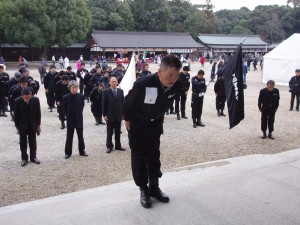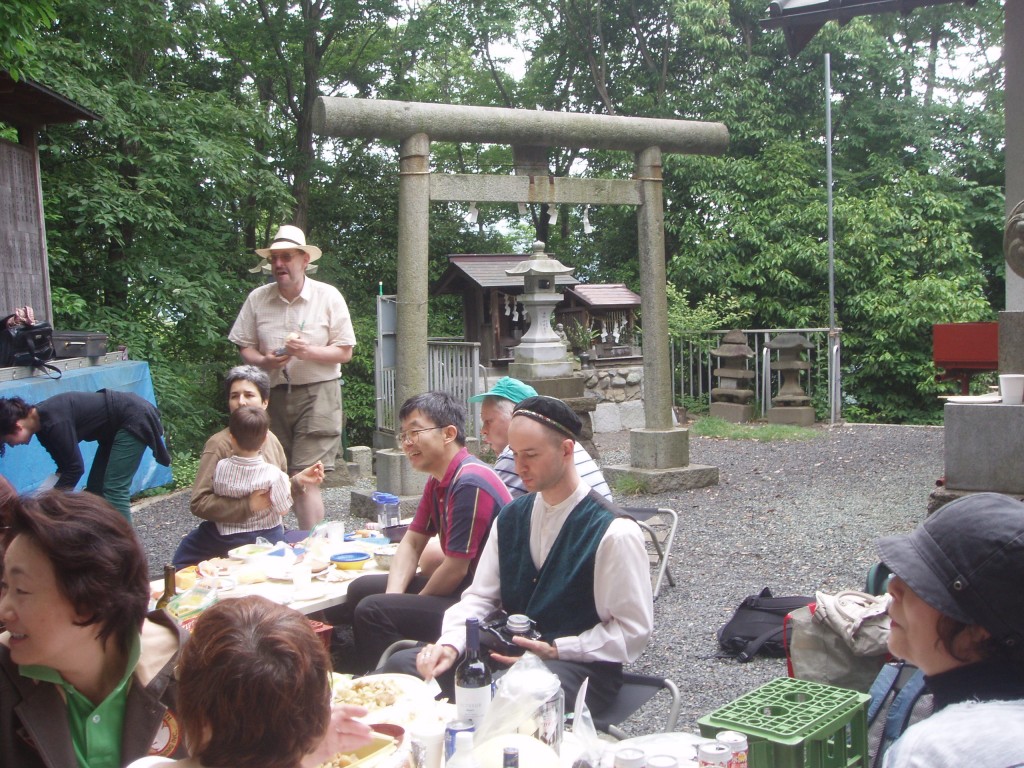
The sun rises on us all, regardless of race
My interest in Shinto started from neo-pagan sympathies, and after coming to live in Japan I was drawn to explore the the pagan and shamanistic connections of the religion. As Herbert Kuhn and others have pointed out, the attraction of Shinto is that it reaches back, through Ainu practices, to the paleolithic beliefs with which early mankind first made sense of the universe. In its cultivation of the numinous, there is a sense of direct communication with the wonder of life.
The problematic feature of Shinto is that along with its primal characteristic of being a nature-based religion is a tribalism based on blood and race. It is for this reason it is often referred to a religion of Japaneseness. It is for this reason too that it has been tied to right-wing nationalism, far from the environmentally friendly nature religion some fondly imagine it to be. Non-Japanese adopting Shinto practice raises the problem of appropriation of other people’s cultures.
Everyone can have their own opinion about this. My own feeling however is to argue against those who talk of ‘cultural theft’ for the following reasons:

Whose religion is it? These guys probably have strong opinions on the matter.
* We live in a postmodern age when cultures mix and merge, whether one likes it or not.
* Nothing stays the same for ever, and traditions too change and develop over time.
* Shinto is itself made up of foreign parts and has never been a ‘purely Japanese’ affair.
Personally I see Shinto as being on the threshold of making the leap from being a tribal religion to one of more universal appeal. And in so doing it is likely to undergo quite significant changes, just as Christianity did in moving from being a Jewish faith to a European-based religion. I find this an exciting prospect.
Once a sufficient number of practitioners emerge, it’s not impossible that there will be a snowball effect with a rush of interest as there was for Zen in the 1950s and 1960s.
An Association of Shintoists based in the West would be an interesting development. Forty years ago shamanism and neo-paganism were virtually unknown in Britain and America: now there is a huge number of followers, and together they are said to be the fastest growing religion. Who knows, one day Shinto too may be written of in similar terms.


As much as you wish to argue for the legitimacy of your appropriation of Shintoism, you are still a “cultural thief.” Shinto is the aboriginal Japanese religion and although it incorporates ?Confucian and Buddhist elements, you will never be legitimately a part of it purely on racial grounds. I say this from a very unique position. My great-grandfather was a kannushi (Shinto priest). I am a descendant of Sugawara Ason non Michizane, deified as the Shinto god Tenjin whose main shrine is Dazaifu Tenmangujinja. History and heritage to the contrary notwithstanding, I am a Christian pastor. As my grandmother explained, I cannot stop being a Shinto and a descendant of Tenjinsama merely because I wish that result. So I say to you without rancor, contrary to your wish, you cannot opt into Shinto even as I cannot opt out. (This is separate and apart from Christ freeing me from the dominion of Satan and this false pagan religion and from the heritage of my long dead ancestor.)
By the way, your understanding of Christianity changing from Judaism to a European religion is a quaint and erroneous generalization. There were centuries between Judaism’s eviction of Christians from among them (they kicked us out, we did not leave) and the rise of European (Western) Christendom. Sts. Origen, Cyil, Augustine, Clement and Athanasius were all Egyptians. Gregory Nyssa Gregory Nazianzus and the other Cappadocian Fathers were Turkish; Turtullian and Cyprian were North Africans. In fact, of the Patristic Fathers of the first five centuries (that’s 500 years) of the Church’s history apart from Judaism, only Irenaeus was European.
Mister Pastor above should read Mencken’s Treatise on the Gods, and also some Mircea Eliade books.
From those readings, I think even if you are not Shinbetsu or Kobetsu, the most universal aspects of Shintoism make those pagan, primitive religions sort of legitimate, because of the relations of man with the sacred.
Also, you see, Gnesiohamartolos, ancient Japanese knew what you are calling God in there pantheon, just like the Chinese in fact enshrined Heaven. I am talking about the Kotoamatsukami, and especially about Ame-no-Minaka-Nushi-no-Kami. There is sadly few datas in english about them on the net, or so it seems, everything I have read about this God is in French. Sorry if you will have to seek a bit.
The main difference between Shinto and Monotheistic religions is that unlike the latter, Shintô priests who knew Ame-no-Minaka-Nushi choose to hide him from the mobs. Many reasons for that, but the main one is that as the most Cosmic God, he is also the more mystic and esoteric one… in fact he is closer to Brahma than YHWH. His mysteries are so deep and sacred it was seen as tantamount to blasphemy to try and explain to the mob or the unfaithful. Maybe they knew this God would led to many abuse and conflicts if they had more actively worshipped him.
And yes, the Emperor is also a descendant of Ame-no-Minaka-Nushi. So even if the jewish ancestry theory is not true, he can still join the conflict for the sole land in the Middle East who don’t have fucking oil and claim it’s kingship. Just kidding. :P
Even though Ame-no-Minaka-Nushi, Bonten, YHWH seems different, reading Mencken, Mircea Eliade and Pichon for exemple, you see they are not so much. Because if they were, there would be almost no History of Religions.
You know, from an Historical point of view, the God of Christianity, YHWH and Adonaï are not the same gods, right ? In fact, the Jews were not even Monotheist at the begining, since there were multiple Elohim. It is because there symbols and teachings are actually different. So at best, if you guys are right, and God exist (or rather that he exists in the way you think he exist, because of course, God exist, their is no way Ame-no-Minaka-Nushi or the God of Seneca who are divinity discovered through intelectual process rather than religious practice, doesn’t “exist”)… that would mean God is a cheating politician who change it’s political program each time the people got fed up with him. Pretty disturbing. ^^’
So… if John want to think of himself as shintoïst, why not ? It’s just a matter of being accepted by religious community, but I would rather call that administrative work than actualy important conversion process. It’s not like Buddhism where being buddhist or buddhist monk is way harder to achieve. ;)
Sects like Amatsukyô would gladly accept though. :p